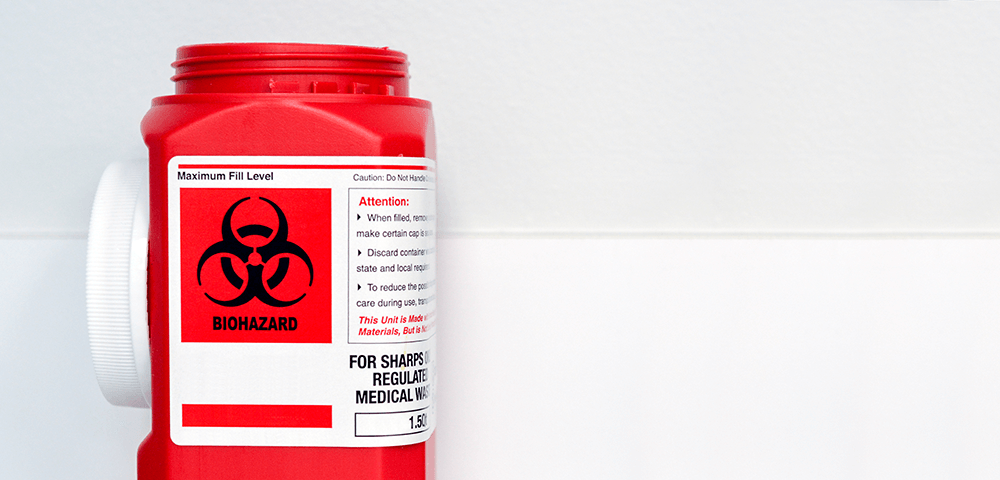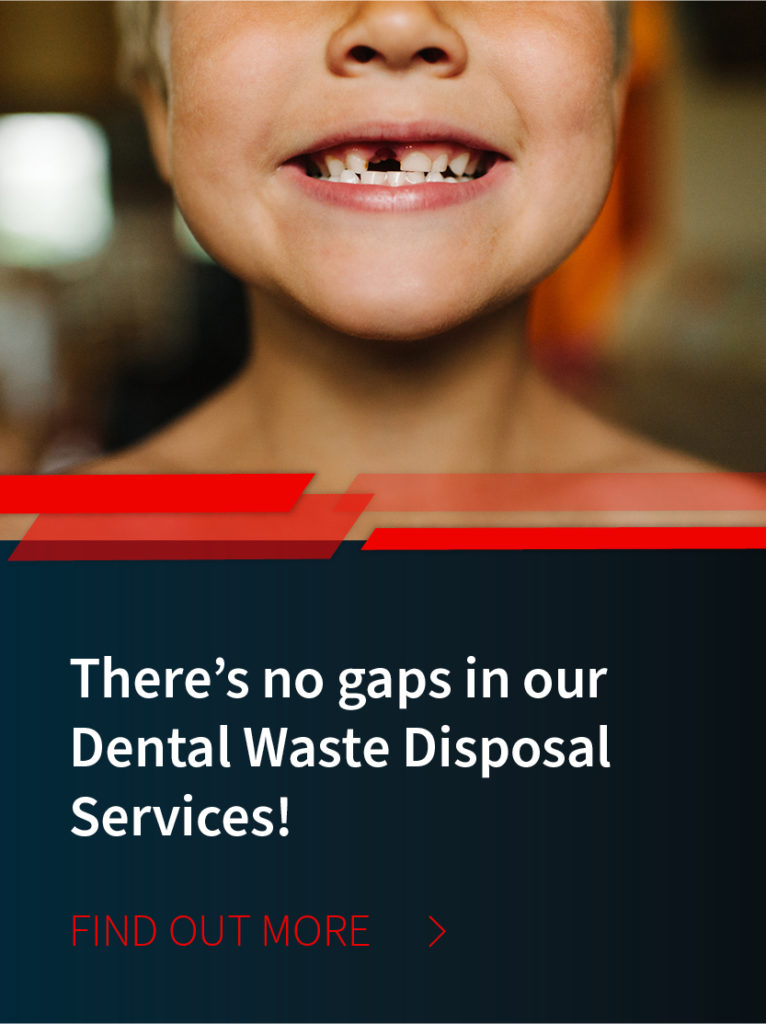
/ IN THIS BLOG
One of the most important parts of medical waste management is knowing the rules and regulations about proper disposal of all healthcare waste streams. This is of such vital importance because improper medical waste disposal has real and dire consequences. For example, disposing of sharps bins incorrectly poses serious risks to individuals who may come into contact with that waste as well as negatively affecting the environment. Know how to properly dispose of sharps bins or containers to avoid fines and penalties, as well as damaging risk to reputation.
01 / Compliant Disposal of Sharps Bins
Know the rules of your state before disposing of sharps and sharps bins or containers. Not all states have the same guidelines, but one thing they do have in common is this: ALL states are required to follow federal regulations for medical waste, including the disposal of sharps bins. You must follow the rules of both the federal government and your state.
Rules for sharps injury protection in Georgia can be found under Georgia’s Rules & Regulations Rule 511-5-9. What about sharps and sharps bins disposal? Turn to Georgia’s Environmental Protection Division and their Department of Natural Resources.
Sharps fall under the umbrella of biomedical waste. Rules for disposal of biomedical waste is found in Georgia’s Rule 391-4-.15. It states, among other guidelines, that:
-
- Sharps, which means any discarded article that may cause punctures or cuts. Such waste includes, but is not limited to, items such as needles, IV tubing and syringes with needles attached, and scalpel blades.
The rule also states that “Sharps shall be contained for storage, transportation, treatment and subsequent disposal in leak-proof, rigid, puncture-resistant containers which are taped closed or tightly lidded to preclude loss of contents.”
And:
“Rigid containers of discarded sharps and all other disposable containers used for containment of biological waste shall be red or orange in color or clearly identified with the universal biohazard symbol or clearly marked with the word “biohazard”.
This rule also provides information regarding the transfer of biomedical waste to off-site treatment or disposal facilities as well as approved methods for treatment of biomedical waste.
In the state of Georgia, medical waste is overseen by the Department of Natural Resources Solid Waste Management Program. Remember that in Georgia, regulations utilize the term “biomedical waste” instead of infectious waste or regulated medical waste.
If you’re not sure what your state, county, or local municipality requires in regard to medical waste disposal or more specifically, sharps container disposal, contact your local health department or city government for guidance.
02 / Disposal Guidelines for Sharps Containers Disposal during COVID
In March 2021, the Centers for Disease Control and Prevention (CDC), in conjunction with the Occupational Safety and Health Administration (OSHA) provided a number of strategies for safe disposal of sharps bins and containers for healthcare facilities and COVID 19 vaccination sites. Sharps disposal containers must “meet Occupational Safety and Health Administration (OSHA) blood-borne pathogens standard requirements to dispose of contaminated needles and other sharps. Use FDA-cleared containers whenever possible.”
03 / Department of Transportation (DOT) Approval
One common mistake when it comes to sharps disposal is merely putting the used sharps in a container or bin and handing it off to your medical waste management company along with your other medical waste.
The Georgia Environmental Compliance Assistance Program (GECAP) provides specific guidelines for biomedical waste disposal in the state of Georgia. The document offers information regarding placement and storage of sharps containers, as well as treatment and disposal.
For example, in Georgia, “biomedical waste may only be transferred, stored, and treated by Environmental Protection Division (EPD) approved facilities with valid operating permits. They specifically state that approve treatment methods include:
-
- Incineration
- Decontamination by heating with steam under pressure (autoclave), or
- Other method specifically approved by the director of the EPD.
When in doubt, contact your local municipal agencies to determine who can accept such waste.
Even if the sharps bin is placed in a red bag, that red bag must be placed in a closed, taped, DOT approved box or container. The red bag waste itself should also be taped and secured closed.
04 / Sharps DON’T Belong in the Trash
Never throw sharps into the garbage! Even if the syringe, needle, or other sharp is in a puncture-resistant sharps container, it must never simply be thrown in the trash.
If the sharp has come in contact with blood, other bodily fluids, or potentially infectious material, it needs to be treated as “red bag waste”. To be properly disposed of, that first means packing the sharps in a properly labeled, sealed, and DOT approved container. The container can then be picked up by a waste management company for disposal or shipped to the autoclave for decontamination prior to disposal.
In the state of Georgia, under Rule 391-3-4-.15, decontamination by autoclave (heating with steam) renders biomedical waste non-infectious. However, specifics regarding this method must be followed, such as: “A recording thermometer shall be used during each complete cycle to ensure the attainment of a temperature of 121°C (250°F) for one half hour or longer in order to achieve decontamination of the entire load.”
The autoclave process kills any bacteria or infectious material that might be on those sharps and readies them for safe disposal. In most cases, sharps don’t need to go to a medical incinerator, which is typically reserved for hazardous materials.
05 / Know the Rules to Maintain Compliance
Dispose of your sharps containers and bins safely. Work only with professional medical waste management companies like MCF Environmental Services to ensure compliance with regulations for sharps container disposal. We make sure that you are aware of the latest laws and regulations for medical waste and can walk your medical facility through what it takes to fully comply.
When the laws are intricate and complicated and the consequences are high, it’s always beneficial to reach out to experts and ensure you’re not committing any violations. For more information about proper sharps disposal or how to ensure you’re in full DOT and federal compliance, contact a representative of MCF Environmental Services for compliance support.
If you would like to learn more about biohazardous waste, proper sharps disposal or the purchase or disposal of sharps containers, contact a representative of MCF Environmental Services on (866) 315-8116 or fill out a form here for a non obligation quote.
Robert Losurdo
President, COO








